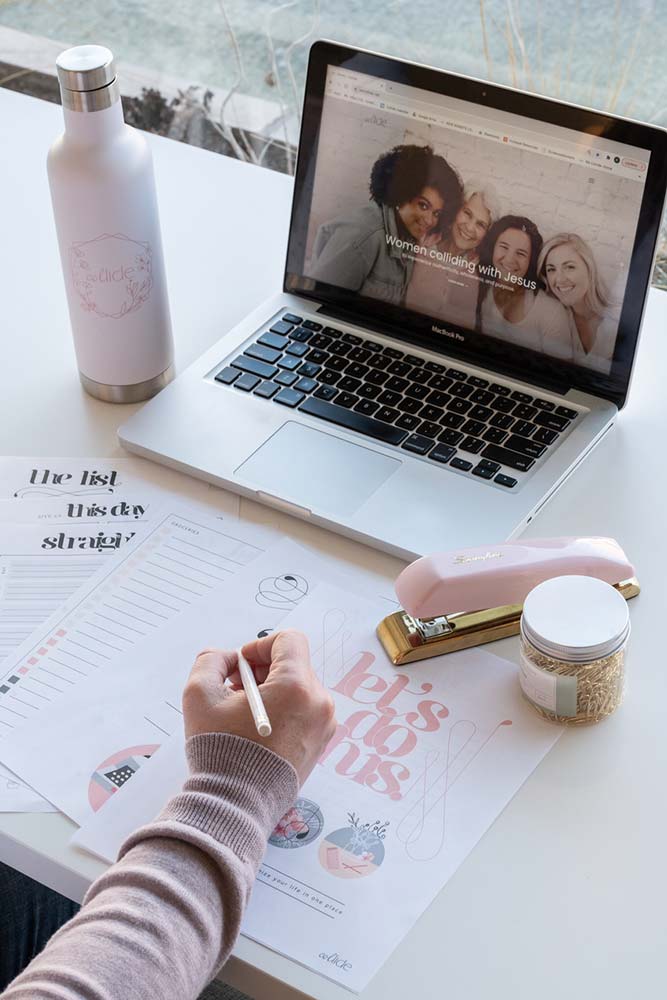
You Don’t Need to Pretend Anymore
At Collide, we believe that God uses ordinary women to do amazing things. He meets us exactly where we’re at – in our mess, our pain, our joy, and our stories. We’ve been amazed how He redeems our brokenness and empowers women in our community and beyond to walk in the confidence of their identity as beloved daughters.
We’d love to introduce you to one of those women, Sue Likkel, who we’ve asked to contribute her voice, her story and her wisdom to the Collide blog.
Sitting on the counselor’s leather sofa, the tears dripped onto the journal open in my lap. Head down, I couldn’t look at her. We were tackling tough topics and though prepared for that, her questions often felt like surgery without anesthesia. Gentle silence sat between us as she allowed me to catch my breath, wipe my eyes and attempt to see myself from another angle. To me, it was a dangerous endeavor; to her, an avenue to freedom I had yet to taste. The task at hand: being willing to be known and seen. I wanted nothing of it and wasn’t budging. Determined to make inroads, she pressed me. Exasperated, I admitted, “I don’t know how to be healthy; I only know how to pretend that I am!” Her voice full of tenderness, she replied, “Well, that’s a place to start then.”
Since that day, I have indeed made incredible progress, thanks to the persistence of a loving Savior. The last three years have found me on a journey of authenticity with Jesus holding my hand like a mother holds their child’s hand when in an unfamiliar place. I first had to have all daily distractions taken away so I could start rebuilding from the ground up. Then, piece by piece, my new self emerged. First was to know that my Creator loved me as I am, not as an ideal me shaped by other voices. The second was to accept the positives about me. Next was to embrace safe people who had earned the right to see and know the real me. Raised in a house where our exterior was more important than our interior, appearance was everything. This new venture required a naked rawness that found me clutching for anything with which I could cover myself.
I wonder if you, too, have also become adept at pretending to be healthy. I get it. That kind of behavior is often rewarded in women. Though it’s a legitimate coping mechanism for chosen times, cultivated to keep us safe from harmful people, I often wonder how many women too frequently operate from that stage of pretend. Social media tells us that we’ve become experts at it. To be honest, most of my pretending was done well before I logged on to any platform. In my childhood home, it was very important that we maintained an emotional equilibrium, never showing frustration, anger, or disappointment – though those were often felt. A public persona was prioritized over any personal need. Any deviation from a polite reservedness was quashed. Raised in this way, one doesn’t dismiss that when grown. Those bad habits followed me throughout my adulthood.
So there I was, on a therapist’s couch, being guided to a life of freedom from pretense. I was scared out of my mind most of the time. To be fake (also known as extremely polite) was so ingrained that I knew no other way of operating in the world, not even with a select few. I just couldn’t turn it off. Until a tragedy struck, and I had no other choice but to learn another way. I’m not the only one who has struggled to be known, but I wish I had been able to avoid the inevitable mistakes one makes when emotionally unhealthy.
On Mother’s Day a few years ago, we bought a young maple tree. Once in the ground, it blossomed, yet its tender branches laden with wide leaves were not strong enough to hold themselves up. The branches seemed to wilt towards the ground. A friend suggested we attach a bamboo rod to the trunk with wire wrapped in rubber. Right away we knew that this was a fine solution: the tree looked strong and healthy and was growing in the way we wanted. Recently we removed the rod only to find it had pressed its shape into the tree and the trunk had grown wider than the original circumference of the wire wraps. Now free of all props, the branches once again drooped, but less than before. It seems to be deciding on the shape it wanted to be – or more likely – it was created to be.
I wanted that tree not only because I feel comforted surrounded by trees, but because it offers me shade. But now as I sit near it, I see myself in it. After “doing the work,” as therapists like to say, I’ve come to a point where I can look more objectively at the years I spent pretending to be emotionally and spiritually healthy. I had my own bamboo rod holding me up and I had outgrown it. Removing it was painful, and it certainly left its literal impression in and on me, but it’s time to take the shape I was created to take – not someone else’s idea of it.
It takes courage to be known and some will misunderstand. We want to be looked on favorably and at the same time be free in our own skin. Sometimes those don’t cohabit smoothly. Thanks to Christ’s faithful guidance, I have a contentment about my life and a sense of peace about myself that I didn’t have before, and I am a thankful girl. Now I know what healthy is, know how to express it, and even embrace it.
Being seen and known can be a beautiful avenue of freedom, one on which Jesus gently holds our hand. Few of us will venture on it alone. It’s simply too hard. But He knows that on that journey, we’ll harness the pain of our past for hope in the future.





